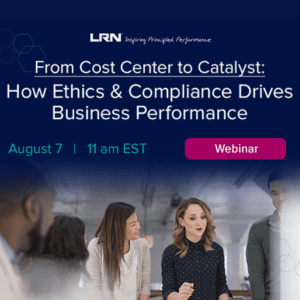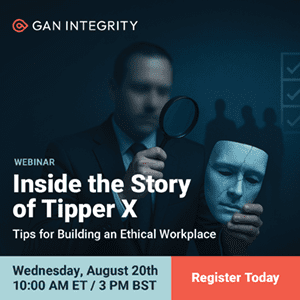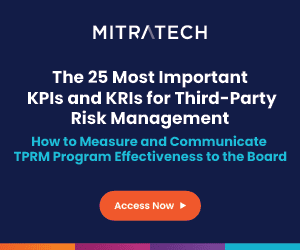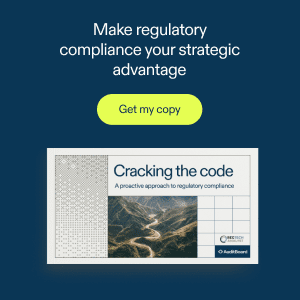With signs that money laundering is on the rise globally, many companies will point to their AML programs and assume they are covered. CreditSafe’s Matthew Debbage explains why that may not be the case for everyone.
Research shows that about $300 billion is laundered in the U.S. each year, with AML compliance costing U.S. companies up to $25.3 billion per year. As if that wasn’t bad enough, a report from the Financial Times found that there was a 50% spike in money laundering fines in 2022. These stats, as shocking as they are, should ring alarm bells for businesses. Money laundering is nothing to underestimate.
I don’t mean to suggest that companies are not taking AML compliance seriously, but I do think it’s worth exploring why this money-laundering surge may be happening and the domino effect it can have on businesses — not just financially but also from a regulatory and reputational perspective.
Misunderstanding customer onboarding is a big part of the problem
When most people think of customer onboarding, they assume it happens after a contract has been signed. So, they build customer success teams and have them focus heavily on training new customers on how to use their solutions and being readily available to answer any questions.
Of course, that’s important. But that’s not when customer onboarding begins — it begins well before the contract has been signed; it’s that in-between stage — after the sales team has worked on a deal and before the finance team has made its decision on whether the deal is approved.
More often than not, you’ll see finance teams run a credit check on potential customers. But that’s just one part of the customer onboarding process, albeit a crucial one. Customer onboarding should also include the following processes if you want to fully protect your business from financial, legal and compliance risks.
- KYC/ID verification: The last thing you want to happen is to find out the company (or director) you’ve been dealing with is a fraud. You need to run the necessary KYC checks to make sure you’re dealing with a legitimate company and not a scammer. Failing to do so could lead to fraudulent payments and damaged customer relationships.
- AML checks: If you work with a customer or supplier that’s involved in money laundering, that could blow back onto your business. If your customers find out, they could lose faith in your brand and go to competitors who aren’t involved with unethical partners.
- Compliance checks: Compliance violations are bad all around. With more regulations being passed to prevent financial crimes and minimize the risk of child/forced labor in supply chains, regulatory violations can result in millions of dollars of fines.
European Regulators Moving the Needle on Real-Time AML Monitoring
Financial institutions may have adopted methods of detecting fraud in real time, but money laundering detection remains an after-the-fact judgment. Finserv specialist Sujata Dasgupta explores how one bank’s adoption of EU guidance could chart a path forward for true money laundering prevention.
Read moreDetailsConfusion, lack of regulatory knowledge and costs are the biggest reasons for non-compliance
There are three primary reasons why companies may skip AML, KYC and compliance checks on new customers and suppliers.
First, it can be a cumbersome undertaking, especially if you don’t know where to start or don’t have the right technology in place to pull up all the pertinent data. And since finance professionals tend to have a lot on their plates, it can often fall down on the list of priorities.
Second, a lot of companies aren’t aware of the different regulations (federal, state and local) that exist or the consequences of non-compliance. For instance, the U.S. was one of the first countries in the world to make money laundering a federal crime with its Money Laundering Control Act of 1986. The U.S. is also a member of the Financial Action Task Force (FATF) and has a strong AML/CFT framework that imposes heavy penalties for non-compliance. But most companies wouldn’t be able to tell you this, let alone prove the systems and processes they have in place to prove compliance.
(In May, Canada passed Bill S-211, known as the Fighting Against Forced Labor and Child Labor in Supply Chains Act. But in speaking to Canadian businesses in the last month, I’ve been somewhat surprised at how few companies were even aware that this law passed and goes into effect Jan. 1, 2024, let alone understand that non-compliance could result in a $250,000 fine per violation.)
And finally, many companies don’t want to spend the money on putting the necessary policies, systems and tools in place to prevent getting involved with unethical, corrupt businesses. In many cases, business leaders assume that the upfront costs of buying compliance tools are just too much to justify. But simple math reveals that’s not the case when you consider that regulators issued billions of dollars in AML fines last year.
In other words: What companies spend on compliance technology is nothing compared to the costs they could face by giving compliance short shrift.
AML is also about ethics
The U.S. was one of the first countries in the world to make money laundering a federal crime with the Money Laundering Control Act of 1986. And this strong enforcement posture has continued to today; earlier this year, Deputy Attorney General Lisa Monaco announced that significant new resources would be devoted to addressing the troubling trend of the intersection of corporate crime and national security.
Given how persistent of a problem it is and how tough of a stance the U.S. government is taking on it, you’d think most companies would make AML and compliance checks a top priority and religiously do their due diligence before signing contracts with customers. But a recent Creditsafe study shows that’s far from the reality. In fact, almost half (41%) of U.S. companies run AML checks on customers only sometimes or rarely, while 38% take the same lax attitude with compliance checks. To make matters worse, 21% never run AML checks and 15% never run compliance checks.
AML and compliance violations aren’t just a financial drain; they can severely hurt your brand reputation and lead to lost customers and sales. The combination of fines and loss of income will only put you in further financial turmoil — making it harder for you to pay your employees, suppliers and vendors on time and negatively impacting your creditworthiness.
Business ethics and profitability don’t have to be at odds with each other. It’s about making the commitment to prioritize ethical practices and understanding how it can directly affect the bottom line. If you don’t believe me, just consider this: According to a report by the World Economic Forum, it’s estimated that sustainable and ethical sourcing practices cut supply chain costs between 9% and 16%, while increasing revenue by up to 20% for responsible products and boosting brand value by 15% to 30%.




 Matthew Debbage is the CEO of the Americas and Asia for Creditsafe. As a longtime veteran of Creditsafe, he has held various leadership roles including COO of Creditsafe Group and CEO of the Americas and Asia since 2012. Over the past 10 years, he led the expansion of the business in the United States, where he has built a high-performing team, driven impressive revenue growth and worked with thousands of American businesses across various industries.
Matthew Debbage is the CEO of the Americas and Asia for Creditsafe. As a longtime veteran of Creditsafe, he has held various leadership roles including COO of Creditsafe Group and CEO of the Americas and Asia since 2012. Over the past 10 years, he led the expansion of the business in the United States, where he has built a high-performing team, driven impressive revenue growth and worked with thousands of American businesses across various industries. 








